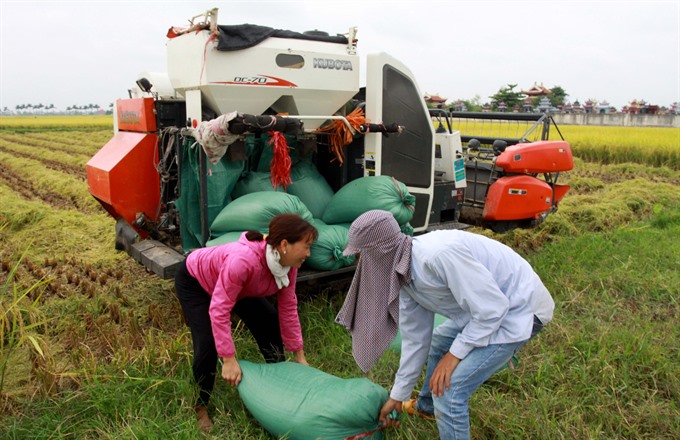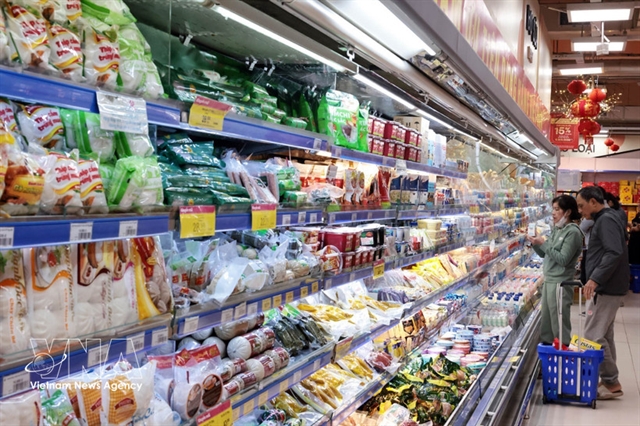 Society
Society

Agricultural development is considered the most effective solution to ‘Zero Hunger’ and poverty reduction initiatives in Việt Nam, contributing to the realisation of sustainable development goals, said Lê Quốc Doanh, deputy minister of Agriculture and Rural Development.
 |
| Farmers harvest rice crop in Vũ An Commune in the northern province of Thái Bình’s Kiến Xương District. Việt Nam doesn’t only produce enough food for domestic consumption but also export between 5 to 7 million tonnes of rice annually to the world market.— VNA/VNS Photo Thế Duyệt |
HÀ NỘI — Agricultural development is considered the most effective solution to ‘Zero Hunger’ and poverty reduction initiatives in Việt Nam, contributing to the realisation of sustainable development goals on ending hunger, achieving food security, improving nutrition and promoting sustainable agriculture, said Lê Quốc Doanh, deputy minister of Agriculture and Rural Development.
Addressing the ceremony which was organised to mark the 38th World Food Day and 40th anniversary of the Food and Agriculture Organisation of the United Nations (FAO) in Việt Nam, he said these goals are key features of FAO’s current work in Việt Nam and built on the solid foundations set during the 40 years of FAO engagement in the country.
“Thanks to the renewal process which began in 1986 and the effective support from international partners including FAO, Việt Nam doesn’t just produce enough food for domestic consumption but also exports between 5 to 7 million tonnes of rice annually to the world market,” he said.
"Up to now, Việt Nam’s agricultural sector has played an important role in ensuring food security for nearly 95 million people, as well as ensuring social stability and livelihoods for nearly 65 per cent of the population in rural areas. The sector accounted for 17 per cent of the country’s GDP, contributing to maintaining a high economic growth rate, social stability and poverty reduction," Doanh said.
He contributed the above-mentioned results to great efforts made by managers, policy makers, investors, enterprises, farmers and the whole community.
The implementation of effective measures aimed at developing a sustainable agricultural production system, enhancing productivity and income for small scale agricultural production households as well as initiatives to reduce food waste were also factors, he said.
According to the FAO, the number of undernourished people in 2017 increased for the third consecutive year. Last year, 11 per cent of the global population, equal to 821 million people suffered from hunger. Meanwhile, other forms of malnutrition have also increased, with at least 1.5 billion people suffering from micronutrient deficiencies that undermined their health in 2017.
“A world without hunger seemed to be a utopia for humankind until recently. However, unprecedented economic development over the last two decades in many parts of the world has opened up the possibility to realistically achieve this goal in the near future”, said Albert T Lieberg, FAO representative in Việt Nam.
To cope with the situation, FAO urged stakeholders to collaborate to achieve Zero Hunger goals, with public and private investment, risk-informed policies and interventions to ensure that the poor and most vulnerable benefit from growth and employment opportunities.
While significant progress had been made, Doanh said, Việt Nam still faced key challenges to ensure food and nutrition security, especially in remote areas and that natural disasters and climate change had become increasing threats.
Given the situation, FAO’s support and technical assistance would continue to play integral roles in helping the country deliver a more prosperous future for its population through sustainable agriculture, green growth and improved livelihoods, he said.
“The people of Việt Nam are an extraordinary example of a success story both in nation and economy building. Nevertheless, we need to be very cautious and always remain on top of the current agenda of constantly changing parameters, in particular the accelerating impact of climate change that is provoking serious challenges for our lives and livelihoods as well as the increasing complexity of trade, nationally and globally,” said Lieberg.
He emphasised that FAO remained committed to supporting Việt Nam in achieving the 2030 Development Agenda and Sustainable Development Goals as well as remaining fully responsive to country changes including broader regional and global issues. — VNS




